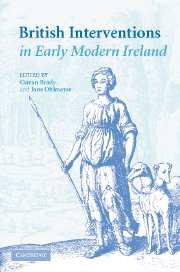Book contents
- Frontmatter
- Contents
- Notes on contributors
- Acknowledgements
- Aidan Clarke: an appreciation
- Conventions
- List of abbreviations
- 1 Making good: New perspectives on the English in early modern Ireland
- 2 The attainder of Shane O'Neill, Sir Henry Sidney and the problems of Tudor state-building in Ireland
- 3 Dynamics of regional development: processes of assimilation and division in the marchland of south-east Ulster in late medieval and early modern Ireland
- 4 The ‘common good’ and the university in an age of confessional conflict
- 5 The construction of argument: Henry Fitzsimon, John Rider and religious controversy in Dublin, 1599–1614
- 6 The Bible and the bawn: an Ulster planter inventorised
- 7 ‘That Bugbear Arminianism’: Archbishop Laud and Trinity College, Dublin
- 8 The Irish peers, political power and parliament, 1640–1641
- 9 The Irish elections of 1640–1641
- 10 Catholic Confederates and the constitutional relationship between Ireland and England, 1641–1649
- 11 Protestant churchmen and the Confederate Wars
- 12 The crisis of the Spanish and the Stuart monarchies in the mid-seventeenth century: local problems or global problems?
- 13 Settlement, transplantation and expulsion: a comparative study of the placement of peoples
- 14 Interests in Ireland: the ‘fanatic zeal and irregular ambition’ of Richard Lawrence
- 15 Temple's fate: reading The Irish Rebellion in late seventeenth-century Ireland
- 16 Conquest versus consent as the basis of the English title to Ireland in William Molyneux's Case of Ireland … Stated (1698)
- Principal publications of Aidan Clarke
- Index
7 - ‘That Bugbear Arminianism’: Archbishop Laud and Trinity College, Dublin
Published online by Cambridge University Press: 31 July 2009
- Frontmatter
- Contents
- Notes on contributors
- Acknowledgements
- Aidan Clarke: an appreciation
- Conventions
- List of abbreviations
- 1 Making good: New perspectives on the English in early modern Ireland
- 2 The attainder of Shane O'Neill, Sir Henry Sidney and the problems of Tudor state-building in Ireland
- 3 Dynamics of regional development: processes of assimilation and division in the marchland of south-east Ulster in late medieval and early modern Ireland
- 4 The ‘common good’ and the university in an age of confessional conflict
- 5 The construction of argument: Henry Fitzsimon, John Rider and religious controversy in Dublin, 1599–1614
- 6 The Bible and the bawn: an Ulster planter inventorised
- 7 ‘That Bugbear Arminianism’: Archbishop Laud and Trinity College, Dublin
- 8 The Irish peers, political power and parliament, 1640–1641
- 9 The Irish elections of 1640–1641
- 10 Catholic Confederates and the constitutional relationship between Ireland and England, 1641–1649
- 11 Protestant churchmen and the Confederate Wars
- 12 The crisis of the Spanish and the Stuart monarchies in the mid-seventeenth century: local problems or global problems?
- 13 Settlement, transplantation and expulsion: a comparative study of the placement of peoples
- 14 Interests in Ireland: the ‘fanatic zeal and irregular ambition’ of Richard Lawrence
- 15 Temple's fate: reading The Irish Rebellion in late seventeenth-century Ireland
- 16 Conquest versus consent as the basis of the English title to Ireland in William Molyneux's Case of Ireland … Stated (1698)
- Principal publications of Aidan Clarke
- Index
Summary
Archbishop Laud's ecclesiastical and political energy has left historians gasping behind him. This is not simply a result of his passion for detail and singleminded capacity for hard work; it is also a product of his geographical and administrative range. With remarkable prescience, he anticipated current concern with the broader ‘British’ dimension of early modern history and viewed religious policy not in a narrowly English sense, or confined only to church matters, but in terms of all three royal dominions, and extending to education as well. The result is a standing challenge, not merely to historians' stamina, but also to the instinctive compartmentalisation of their approach to the 1630s which has sought to confine Laud within national boundaries and see him solely as an ecclesiastical leader.
To understand Laud's policies and those of his royal master thus requires historians to expand their horizons beyond the southern province of England, to the more marginal regions of England and Wales, and even to the remote fastnesses of Scotland and Ireland. Recent studies of Laud's involvement in Ireland, for example, have demonstrated how the change in context and freedom of action can help to reveal some of his inner motives and ideological concerns. In England it is possible to argue about whether Laud in fact exercised any direct power, even to claim that he was merely an obedient servant of the real driving force, King Charles I, thus replacing ‘Laudianism’ by ‘Carolinism’.
- Type
- Chapter
- Information
- British Interventions in Early Modern Ireland , pp. 135 - 160Publisher: Cambridge University PressPrint publication year: 2005
- 4
- Cited by

